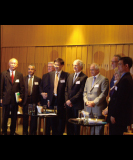You are browsing > Service in Taiwan > Development
Strong progress seen on international tax transparencyOECD
Tax evasion continues to challenge governments in developing and developed countries alike, depriving them of resources that would otherwise be available to support sustainable development through investments in infrastructure, health and other common goods. While globalisation has brought many opportunities and advances, its dark side has included the greater ease with which individuals can shift income and assets offshore and out of sight of tax authorities.
The OECD-hosted Global Forum on Transparency and Exchange of Information for Tax Purposes has been working to enhance global tax transparency, end banking secrecy and protect public finances by curtailing tax evasion since 2008. It has developed a series of international tax transparency standards and constantly monitors and reviews implementation and adhesion by its 142 members. It is part of the international efforts on tax transparency that also include the OECD/G20 BEPS Initiative.
In July 2016, G20 countries called on the Global Forum to devise objective criteria to identify jurisdictions that have not made sufficient progress toward a satisfactory level of implementation of the agreed international standards. These include those on Exchange of Information on Request (EOIR) and Automatic Exchange of Information (AEOI).
A list of non-cooperative jurisdictions was to be prepared for the G20 Leaders Summit in Hamburg in July 2017, with jurisdictions needing to meet at least two of the three benchmarks to avoid inclusion:
i. at least a “Largely Compliant” rating with respect to the Exchange Of Information on Request standard;
ii. a commitment to implement the Automatic Exchange Of Information standard, with first exchanges in 2018 (with respect to the year 2017) at the latest; and
iii. Participation in the Multilateral Convention on Mutual Administrative Assistance on Tax Matters or a sufficiently broad exchange network permitting both EOIR and AEOI.
In addition, an overriding criterion applies in the case where a jurisdiction is determined by the Global Forum peer review process to be “non-compliant”, or is blocked from moving past Phase 1 of the EOI standard, or where it was previously blocked from moving past Phase 1 and has not yet received an overall rating under the Phase 2 process.
The Global Forum established a Fast-Track review process to evaluate continuing efforts by some jurisdictions to meet transparency standards in the run-up to the G20 Summit. The latest results of the Fast Track review show that progress has now been made by most jurisdictions in meeting the international tax transparency standards.
Fifteen jurisdictions which previously had a less than satisfactory rating on their peer reviews against the EOIR standard, were evaluated to assess whether recent progress would upgrade their rating if they were to be reviewed again.
Following the evaluation, the Global Forum assigned the following provisional ratings:
Largely Compliant - Andorra, Antigua and Barbuda, Costa Rica, Dominica, the Dominican Republic, Guatemala, the Federated States of Micronesia, Lebanon, Nauru, Panama, Samoa, the United Arab Emirates and Vanuatu.
Partially Compliant - Marshall Islands.
Trinidad and Tobago, which previously had a rating of Non-Compliant, was unable to demonstrate progress to warrant any upgrade to its rating.
Applying the objective criteria, and taking into account the fast track reviews, Trinidad and Tobago has been identified as the only jurisdiction which has not yet made sufficient progress towards satisfactory implementation of the tax transparency standards. Discussions are continuing with Trinidad and Tobago, and progress is anticipated soon.
The Global Forum’s fast track process was a rigorous process and informed by peer input but does not substitute a full peer review. In all cases a full review will be carried out and a peer evaluation done against the revised international standard for exchange of information on request, which now includes the requirement of beneficial ownership.
The provisional ratings reflect the strong progress made by the jurisdictions in implementing the EOIR Standard. A number of critical changes have been introduced by the reviewed jurisdictions, including the elimination of strict bank secrecy and bearer shares, improved access to accounting records and a more rigorous oversight and enforcement of obligations to maintain information. Further progress has also been achieved on expanding the breadth of the exchange networks including signature of the Multilateral Convention on Mutual Administrative Assistance on Tax Matters.
These fast track results mark the end of the first round of EOIR peer reviews, and will be delivered to the G20 Leaders Summit on 7-8 July 2017 in Hamburg, Germany. A second round of peer reviews is now underway, with the first outcomes to be released later this year. Jurisdictions which benefited from fast track will be reviewed early in the second round review process.
A Background Note on continuing progress on tax transparency is available at: http://www.oecd.org/tax/transparency/brief-and-FAQ-on-progress-on-tax-transparency.pdf









